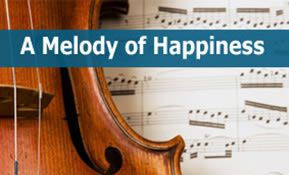
A Daily Requirement
This daily hour of hitbodedut (personal prayer) is not only the key to a person’s self composure, but a key to his emotional health and spiritual success as well…

Translated by Rabbi Lazer Brody
In Forest Fields, Part 17
The power of perseverance
Gratitude is also an important part of one’s daily personal prayer agenda. A person who fails to thank Hashem for his myriad of blessings every day both fails to recognize those blessings and takes them for granted. But, with daily thanks to Hashem, we observe the wonderful favors that Hashem does for us every day and we don’t fall into the pitfalls of ingratitude.
No one likes an ingrate. Yet, if we’re not perseverant about designating daily time for thanking Hashem, we either fail to recognize all the gifts that Hashem gave us that day (every heartbeat, every breath, shelter, clothing – think about it, the list is endless!) or we forget to thank Him altogether.
The barometer of emuna is satisfaction with one’s lot in life. When we ponder our blessings, we appreciate them much more and express our gratitude. In that respect, perseverant personal prayer enhances one’s satisfaction with his lot in life, and is therefore conducive to emuna. Reinforced emuna enables us to be closer to Hashem.
The three elements of daily gratitude, self-evaluation, and teshuva that are all incorporated in our personal prayer are marvelous for emotional and spiritual health.
A daily requirement
Rebbe Nachman of Breslev regards daily personal prayer as an absolute requirement for every person. He says (Likutei Moharan, I:100), “From young to old [literally, from “small to big”], one cannot be a truly upright [literally, a kosher] person without hitbodedut.”
 Why an hour a day? Many of our sages instructed the general populace to do at least an hour or more every day of personal prayer and soul-searching. Rebbe Nachman writes (ibid, II:25), “Hitbodedut is a lofty virtue and greater than anything, in other words, to designate an hour or more for secluded personal prayer in a room or out in the field and to converse with his Creator…this form of praying and speaking should be in his own spoken jargon.” This daily hour is not only the key to a person’s self composure, but a key to his emotional health and spiritual success. Without it, a person is liable to forget what he’s really supposed to be doing in this world.
Why an hour a day? Many of our sages instructed the general populace to do at least an hour or more every day of personal prayer and soul-searching. Rebbe Nachman writes (ibid, II:25), “Hitbodedut is a lofty virtue and greater than anything, in other words, to designate an hour or more for secluded personal prayer in a room or out in the field and to converse with his Creator…this form of praying and speaking should be in his own spoken jargon.” This daily hour is not only the key to a person’s self composure, but a key to his emotional health and spiritual success. Without it, a person is liable to forget what he’s really supposed to be doing in this world. Self Evaluation
At the end of each day, a person has to ask himself what he’s gained by transgressing the Torah, G-d forbid, and compare that with what he stands to lose by going against Hashem’s will. On the other hand, he should ask himself what he’s lost by doing a mitzvah, and compare that with what he stands to gain by doing Hashem’s will (see Pirkei Avot, 2:1).
Anyone that engages in self evaluation is guaranteed to see the benefits of doing Hashem’s will. He doesn’t even have to wait until the world to come to reap his rewards, for in this world, he will already experience a sense of gratification, joy, and satisfaction. As for the next world, unfathomable rewards await him. Compare this to material amenities; we all know that they never satisfy us. Even when we dream of some material goal, once we reach it, we’re not satisfied, especially since the neighbor has something better than we do. The jealousy and competition of this world leave us with a terrible bitter taste in our mouths.
Rebbe Nachman described the evil inclination as someone running in the marketplace with a closed fist. Everybody runs after him, because they think he has some rare treasure in his hand. After they’ve spent an entire day chasing him, he opens his hand and waves his empty palm at them, laughing at their gullibility. They wasted an entire day for nothing.
The same goes for bodily lusts. One would think that a person would be happy once he attains whatever he desires, but the opposite is true. Take for example the meal that a glutton eats in a fancy restaurant; after the meal, he has a guilty conscience about over-eating and breaking his diet. What’s worse, he has to pay an exorbitant price for food that he now regrets eating. His body suffers, his conscience suffers, and his wallet suffers. Such is the outcome of bodily lusts.
On the other hand, mitzvahs impart a glowing illumination on the soul. Sure, maybe he didn’t have the money to help a person in need, but once he strengthens himself and performs the mitzvah, his soul glows with gratification. With true self evaluation, when a person takes inventory of his day’s deeds, he’ll discover that a ten-dollar mitzvah is worth more to him than millions, for more than anything, the mitzvah brings a person closer to Hashem. Proximity to Hashem is a priceless commodity for the soul.
Daily self-evaluation helps us to keep our lives and goals in proper perspective. We can therefore conclude that a person who is close to self-evaluation is close to Hashem. By the same token, one who is far from self-evaluation is far from Hashem.
The way of the Torah is the way to a good life, marital bliss, successful children, adequate income and a myriad of other blessings. A Torah lifestyle is interesting, for one who learns Torah on a daily basis always his fresh challenges and intellectual stimulation. Compare this to a life of lust, bodily appetites, and pursuit of material amenities. They are all a mirage, a fantasy bubble that bursts and leaves a person with nothing. In fact, at the time of this writing, the world has entered a major financial recession, characterized by a crash of the stock exchange, bankruptcy of financial institutions and major corporations, and widespread unemployment. Millions who have devoted their lives to monetary goals are now left with nothing.
Without daily self-evaluation, a person will lack the inner strength and conviction that he needs to avoid the lies and pitfalls of this lowly material world. With daily self-evaluation, one will taste the sweetness of a life of truth and purpose.
To be continued.













Tell us what you think!
Thank you for your comment!
It will be published after approval by the Editor.